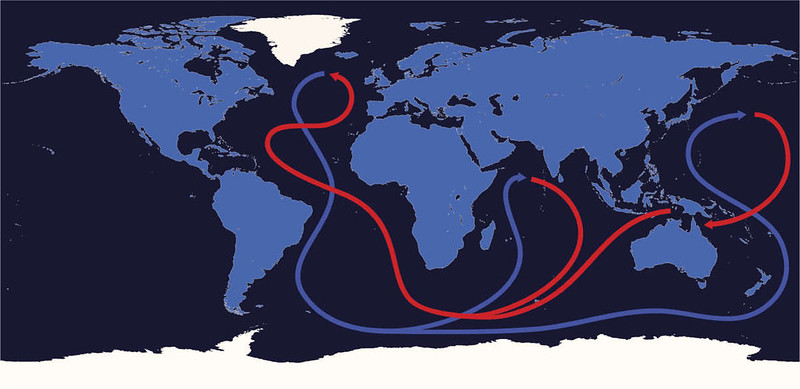“The new study adds significantly to the rising concern about an AMOC collapse in the not-too-distant future,” said one scientist. “We will ignore this at our peril.”
By Brett Wilkins. Published 2-10-2024 by Common Dreams

A study published Friday warned that a systemic collapse of the Atlantic Ocean currents driving warm water from the tropics toward Europe could be more likely than researchers previously estimated—an event that would send temperatures plummeting in much of the continent.
The Atlantic Meridional Overturning Circulation (AMOC), which includes the Gulf Stream, could be headed for a relatively sudden shutdown that René Van Western, who led the Dutch study published in Science Advances, called “cliff-like.”
For many millennia, the Gulf Stream has carried warm waters from the Gulf of Mexico northward along the eastern North American seaboard and across the Atlantic to Europe. As human-caused global heating melts the Greenland ice sheet, massive quantities of fresh water are released into the North Atlantic, cooling the AMOC—which delivers the bulk of the Gulf Stream’s heat—toward a “tipping point” that could stop the current in its tracks.
An AMOC shutdown would cause temperatures to rise in the Southern Hemisphere but plunge dramatically in Europe. In the study’s model, London cools by an average of 18°F and Bergen, Norway by 27°F. An AMOC failure would also cause sea levels to rise along North America’s east coast.
“We are moving closer [to the collapse], but we we’re not sure how much closer,” van Westen told The Associated Press. “We are heading towards a tipping point.”
New study: the Atlantic overturning circulation AMOC “is on tipping course”.
— Prof. Stefan Rahmstorf 🌏 🦣 (@rahmstorf) February 9, 2024
The paper by Dutch colleagues adds more weight to recent warnings, such as the OECD Climate Tipping Points report of 2022 and the Global Tipping Points report published 2023. https://t.co/yJjUGRlqXm
According to the study:
Although AMOC collapses have been induced in complex global climate models by strong freshwater forcing, the processes of an AMOC tipping event have so far not been investigated. Here, we show results of the first tipping event in the Community Earth System Model, including the large climate impacts of the collapse. Using these results, we develop a physics-based and observable early warning signal of AMOC tipping: the minimum of the AMOC-induced freshwater transport at the southern boundary of the Atlantic. Reanalysis products indicate that the present-day AMOC is on route to tipping. The early warning signal is a useful alternative to classical statistical ones, which, when applied to our simulated tipping event, turn out to be sensitive to the analyzed time interval before tipping.
“The research makes a convincing case that the AMOC is approaching a tipping point based on a robust, physically based early warning indicator,” said Tim Lenton, director of the University of Exeter’s Global Systems Institute. “What it cannot and does not say is how close the tipping point, because… there is insufficient data to make a statistically reliable estimate of that.
“We have to plan for the worst,” added Lenton, who was not involved in the Dutch study. “We should invest in collecting relevant data and improving estimation of how close a tipping point is, improving assessment of what its impacts would be, and getting pre-prepared for how we could best manage and adapt to those impacts if they start to unfold.”
Stefan Rahmstorf—who leads the Earth Systems Analysis department at the Potsdam Institute for Climate Research in Germany and was not part of the new study—called the research “a major advance in AMOC stability science.”
“The new study adds significantly to the rising concern about an AMOC collapse in the not-too-distant future,” Rahmstorf told The Associated Press. “We will ignore this at our peril.”
This work is licensed under Creative Commons (CC BY-NC-ND 3.0).

